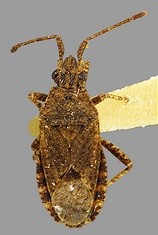MIAMI - U.S. Customs and Border Protection (CBP) Office of Field Operations (OFO) agriculture specialists at Miami International Airport (MIA) intercepted an unusual pest identified as vazquezitocoris andinus Van Duzee (Coreidae) during an intensive inspection of a shipment of cut flowers from Ecuador on May 30. The U.S. Department of Agriculture (USDA) confirmed July 15 that this marks the first nationwide interception of this pest.
These particular pests are commonly referred to as “plant” or “squash” bugs and are currently found in Peru and Ecuador. As of yet, the natural history and agriculture importance of this species is unknown. The entire shipment was fumigated on June 1.
“Finding a first-in-nation pest is an exceptional achievement for our CBP agriculture specialists,” said MIA Port Director Christopher Maston. “They are committed to detecting and preventing dangerous pests from entering the U.S. and destroying agricultural resources.”
CBP agriculture specialists are the first line of defense in the protection of U.S. agriculture, forest and livestock industries from destructive plant pests and animal diseases. They are highly trained and experienced in biological sciences and inspection techniques used to detect biological threats.
Each year, CBP agriculture specialists intercept tens of thousands of “actionable pests” – those identified through scientific risk assessment and study as being dangerous to the health and safety of U.S. agricultural resources.
To see more CBP activity in Florida, visit @CBPFlorida on Twitter.


